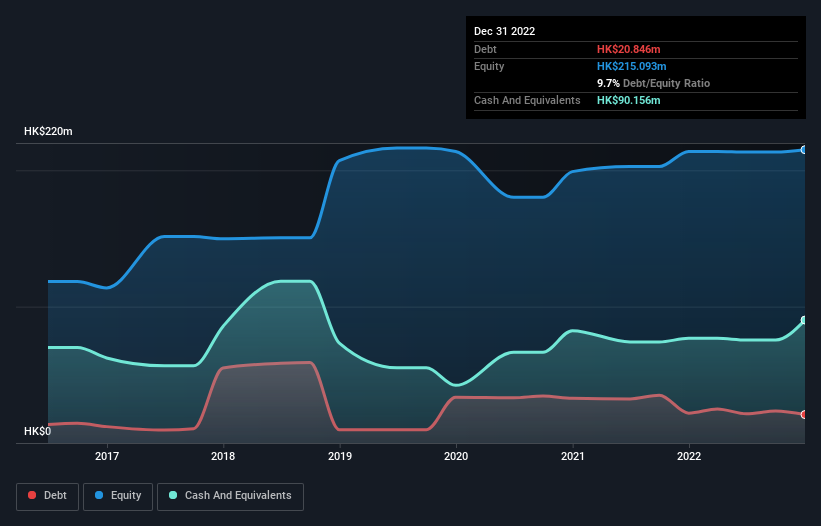- Hong Kong
- /
- Commercial Services
- /
- SEHK:8201
Here's Why PPS International (Holdings) (HKG:8201) Can Manage Its Debt Responsibly

The external fund manager backed by Berkshire Hathaway's Charlie Munger, Li Lu, makes no bones about it when he says 'The biggest investment risk is not the volatility of prices, but whether you will suffer a permanent loss of capital.' It's only natural to consider a company's balance sheet when you examine how risky it is, since debt is often involved when a business collapses. We note that PPS International (Holdings) Limited (HKG:8201) does have debt on its balance sheet. But the more important question is: how much risk is that debt creating?
When Is Debt A Problem?
Debt and other liabilities become risky for a business when it cannot easily fulfill those obligations, either with free cash flow or by raising capital at an attractive price. In the worst case scenario, a company can go bankrupt if it cannot pay its creditors. However, a more frequent (but still costly) occurrence is where a company must issue shares at bargain-basement prices, permanently diluting shareholders, just to shore up its balance sheet. Of course, debt can be an important tool in businesses, particularly capital heavy businesses. The first thing to do when considering how much debt a business uses is to look at its cash and debt together.
View our latest analysis for PPS International (Holdings)
What Is PPS International (Holdings)'s Net Debt?
The image below, which you can click on for greater detail, shows that PPS International (Holdings) had debt of HK$20.8m at the end of December 2022, a reduction from HK$21.9m over a year. However, it does have HK$90.2m in cash offsetting this, leading to net cash of HK$69.3m.

How Healthy Is PPS International (Holdings)'s Balance Sheet?
We can see from the most recent balance sheet that PPS International (Holdings) had liabilities of HK$77.0m falling due within a year, and liabilities of HK$921.0k due beyond that. Offsetting these obligations, it had cash of HK$90.2m as well as receivables valued at HK$139.2m due within 12 months. So it actually has HK$151.4m more liquid assets than total liabilities.
This surplus liquidity suggests that PPS International (Holdings)'s balance sheet could take a hit just as well as Homer Simpson's head can take a punch. With this in mind one could posit that its balance sheet means the company is able to handle some adversity. Simply put, the fact that PPS International (Holdings) has more cash than debt is arguably a good indication that it can manage its debt safely.
The modesty of its debt load may become crucial for PPS International (Holdings) if management cannot prevent a repeat of the 54% cut to EBIT over the last year. Falling earnings (if the trend continues) could eventually make even modest debt quite risky. There's no doubt that we learn most about debt from the balance sheet. But it is PPS International (Holdings)'s earnings that will influence how the balance sheet holds up in the future. So if you're keen to discover more about its earnings, it might be worth checking out this graph of its long term earnings trend.
But our final consideration is also important, because a company cannot pay debt with paper profits; it needs cold hard cash. PPS International (Holdings) may have net cash on the balance sheet, but it is still interesting to look at how well the business converts its earnings before interest and tax (EBIT) to free cash flow, because that will influence both its need for, and its capacity to manage debt. Over the last three years, PPS International (Holdings) recorded negative free cash flow, in total. Debt is usually more expensive, and almost always more risky in the hands of a company with negative free cash flow. Shareholders ought to hope for an improvement.
Summing Up
While it is always sensible to investigate a company's debt, in this case PPS International (Holdings) has HK$69.3m in net cash and a strong balance sheet. So we are not troubled with PPS International (Holdings)'s debt use. When analysing debt levels, the balance sheet is the obvious place to start. But ultimately, every company can contain risks that exist outside of the balance sheet. To that end, you should learn about the 4 warning signs we've spotted with PPS International (Holdings) (including 1 which makes us a bit uncomfortable) .
When all is said and done, sometimes its easier to focus on companies that don't even need debt. Readers can access a list of growth stocks with zero net debt 100% free, right now.
New: Manage All Your Stock Portfolios in One Place
We've created the ultimate portfolio companion for stock investors, and it's free.
• Connect an unlimited number of Portfolios and see your total in one currency
• Be alerted to new Warning Signs or Risks via email or mobile
• Track the Fair Value of your stocks
Have feedback on this article? Concerned about the content? Get in touch with us directly. Alternatively, email editorial-team (at) simplywallst.com.
This article by Simply Wall St is general in nature. We provide commentary based on historical data and analyst forecasts only using an unbiased methodology and our articles are not intended to be financial advice. It does not constitute a recommendation to buy or sell any stock, and does not take account of your objectives, or your financial situation. We aim to bring you long-term focused analysis driven by fundamental data. Note that our analysis may not factor in the latest price-sensitive company announcements or qualitative material. Simply Wall St has no position in any stocks mentioned.
About SEHK:8201
PPS International (Holdings)
An investment holding company, provides environmental and cleaning services in Hong Kong and the People’s Republic of China.
Flawless balance sheet and good value.
Market Insights
Community Narratives



